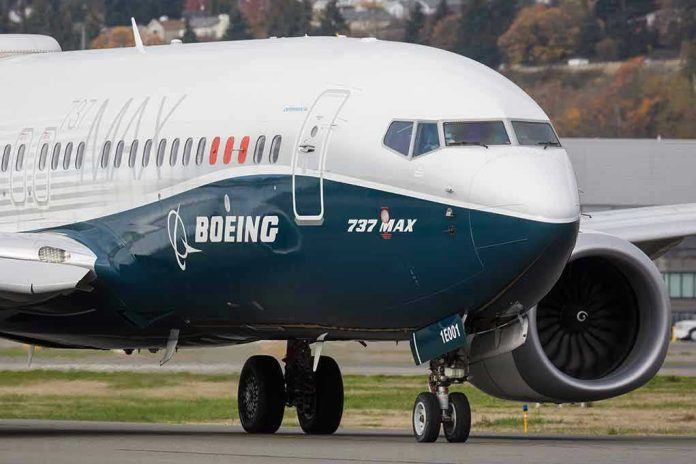🔴 Website 👉 https://u-s-news.com/
Telegram 👉 https://t.me/usnewscom_channel
Bangladesh’s decision to order 25 Boeing jets and pile American wheat into its import basket is the latest example of foreign governments gaming the system to snag tariff relief from the United States—while our producers and taxpayers are left wondering when “America First” will actually mean America first.
At a Glance
- Bangladesh orders 25 Boeing aircraft and increases imports of U.S. wheat to secure relief from stiff Trump-era tariffs.
- U.S. trade deficit with Bangladesh stands at $6 billion, fueling calls for more reciprocal trade agreements.
- Bangladeshi officials are in Washington for high-stakes negotiations to lift the 35% tariff on their exports.
- Experts warn these one-off deals may not solve the underlying structural problems in global trade relationships.
Boeing Jets and Wheat: A Price Tag for Tariff Relief
Bangladesh’s latest maneuver is as obvious as it is irritating. Their government has officially inked a deal for 25 Boeing jets, expanding on a previous order, while also locking in a hefty contract for American wheat. This strategy isn’t subtle: buy enough American goods and maybe the White House will look the other way on those punishing tariffs. The U.S. hit Bangladesh with a 35% tariff on their goods, especially garments, in an attempt to finally address a lopsided trade relationship that’s seen our deficit balloon to $6 billion in their favor. Now, the Bangladeshis are hoping their shopping spree will convince Washington to back off, as their own officials—headed by Commerce Secretary Mahbubur Rahman—head to D.C. for what they’re calling “final tariff talks.” It’s a move straight out of the playbook used by India and Vietnam, who also ordered jets from Boeing to curry favor with U.S. trade negotiators. The question is, why does this keep happening? Why do we reward countries that have spent years flooding American markets with cheap goods at the expense of our own manufacturers and workers?
Bangladesh orders 25 Boeing planes as part of push to ease US tariffs https://t.co/iDsHuIZW5W https://t.co/iDsHuIZW5W
— Reuters (@Reuters) July 27, 2025
Bangladesh’s national airline, Biman, gets a shiny new fleet; U.S. wheat exporters get a windfall. But for the American taxpayer, there’s a lingering sense that we’re being played—again. Instead of holding firm, insisting on real structural changes and true reciprocity, we’re watching another country sidestep the rules with a big-ticket purchase and a handshake. Where’s the long-term strategy to protect American jobs and industries, rather than just scoring a one-off headline?
Tariff Tactics: Who Really Wins?
The 35% tariff was never about punishing Bangladesh for the sake of it. It was an overdue response to a trade deficit that’s been growing for years, fueled by cheap garment exports flooding our shelves. The Trump administration did what previous administrations refused to do: put America’s interests at the center of our trade policy. That meant demanding more from countries who treat our market like a dumping ground while protecting their own industries with tariffs, subsidies, and red tape. Bangladesh’s move to buy U.S. planes and wheat is being hailed in some corners as a “win-win,” but experts caution that these kinds of deals often amount to a Band-Aid, not a cure. Large aircraft orders have become a predictable diplomatic tool for countries looking to escape the consequences of unfair trade practices. It’s a tactic that makes for flashy press releases but does little to address the deeper problems that keep American workers on the losing end.
Bangladesh isn’t the only one playing this game. India, Vietnam, and Indonesia have all placed eye-popping Boeing orders when facing U.S. trade pressure. The result? Temporary relief for their exporters, new business for Boeing, and a missed opportunity to demand the kind of real, structural reforms that would put American workers first.
Who’s Calling the Shots—and Who Pays the Price?
Commerce Secretary Mahbubur Rahman leads the Bangladeshi side, while U.S. trade officials once again find themselves in the position of referee rather than defender. The delegation from Bangladesh is in Washington now, with meetings scheduled through the end of July. They’re pushing hard for tariff relief, arguing that their purchases of Boeing jets and U.S. wheat should be enough to restore “balance” to the trade relationship. But what about balance for American workers, farmers, and manufacturers? The U.S. holds the leverage, but every time we let a country buy its way out of tough trade action, we send a message: Just spend enough, and the rules don’t apply to you. This isn’t just about Boeing’s bottom line or Bangladesh’s fleet—this is about the integrity of our trade policy and the future of American jobs. If we keep allowing one-off deals to substitute for real accountability, we’ll never fix the underlying problems that got us here in the first place.
Bangladeshi exporters—especially in their massive garment sector—stand to benefit the most, while U.S. manufacturers and agricultural exporters get a short-term boost. But for the American public, the cost is longer-term: a trade policy that’s always for sale to the highest bidder, rather than a shield for American families and industries.
Expert Opinions: Band-Aid or Blueprint?
Aviation analysts and trade experts agree on one thing: these headline-grabbing deals are great for photo ops, but they rarely solve the root issues. Yes, Bangladesh’s purchase modernizes its airline and keeps Boeing humming, but it also sets a precedent other countries will rush to exploit. Economists warn that while reciprocal buying can provide a quick fix, it doesn’t address the real structural imbalances that have hollowed out American industry. The long-term answer isn’t more deals—it’s a trade policy built on principle, not just purchase orders. If America is going to lead again, it’s time to stop letting foreign governments set the terms and start demanding real, lasting change that puts our interests first.
Bangladesh’s gambit is a symptom, not a solution. Until we get serious about protecting our markets and demanding real reciprocity, we’ll keep seeing headlines like this—while the underlying problems only get worse.
Sources:

